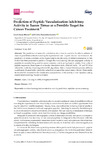Prediction of Peptide Vascularization Inhibitory Activity in Tumor Tissue as a Possible Target for Cancer Treatment

Use este enlace para citar
http://hdl.handle.net/2183/23950Coleccións
Metadatos
Mostrar o rexistro completo do ítemTítulo
Prediction of Peptide Vascularization Inhibitory Activity in Tumor Tissue as a Possible Target for Cancer TreatmentData
2019-07-31Cita bibliográfica
Liñares-Blanco, J.; Fernandez-Lozano, C. Prediction of Peptide Vascularization Inhibitory Activity in Tumor Tissue as a Possible Target for Cancer Treatment. Proceedings 2019, 21, 15.
Resumo
[Abstract]The prediction of metabolic activities in silico form is crucial to be able to address all research possibilities without exceeding the experimental costs. In particular, for cancer research, the prediction of certain activities can be of great help in the discovery of different treatments. In this work it has been proposed to predict, through Machine Learning, the anti-angiogenic activity of peptides is currently being used in cancer treatment and is giving hopeful results. From a list of peptide sequences, three types of molecular descriptors were obtained (AAC, DC and TC) that offered the possibility of training different ML algorithms. After a Feature Selection process, different models were obtained with a predictive value that surpassed the current state of the art. These results shown that ML is useful for the classification and prediction of the activity of new peptides, making experimental screening cheaper and faster.
Palabras chave
Machine learning
Feature selection
Activity prediction
Peptides
Cancer
Screening
Feature selection
Activity prediction
Peptides
Cancer
Screening
Versión do editor
Dereitos
Atribución 3.0 España
ISSN
2504-3900






